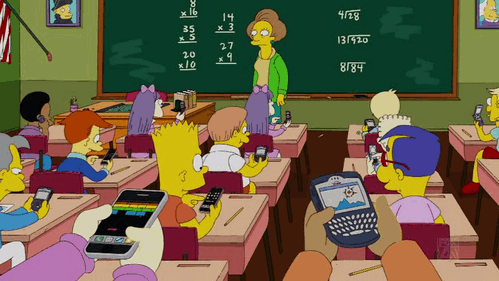|
As mobile technology has become more widespread, however, some instructors have begun to include texting or digital technology in their lesson plans, which begs the question: Is it still distracting to students? Can students reply to and send messages about class content without being distracted?
A new study by J.H. Kuznekoff, et. al., examines these questions. The researchers tested students using mobile devices in class to respond to messages that were related or unrelated to classroom material; additionally, the researchers varied the form of the messages (responding to another message or composing an original one) and the frequency of the texts. Their results are compiled in the article "Mobile Phones in the Classroom: Examining the Effects of Texting, Twitter, and Message Content on Student Learning." Students who replied to messages relevant to class material scored higher on multiple choice tests than students who replied to messages that were unrelated to the class. The study authors conclude from this that "sending or receiving relevant messages may allow students to engage in similar processes as those that occur during note-taking. Specifically, relevant messages may allow students to encode lecture content in a manner similar to the processes that occur during note-taking (Peverly et al., 2013)." The frequency of messaging was also found to be a factor in the interruption of learning: Students who tweeted or sent messages with higher frequency on content not related to the class took lower quality notes than those who tweeted less frequently on non-classroom related subjects. The first group also scored up to 17 percent lower than the control group on multiple-choice tests, evidence that engaging in messaging unrelated to the class hurts student learning. While many instructors assume that mobile devices interrupt learning processes in the classroom -- even when they are related to material being studied -- this research points to the value that such devices may impart. That said, the study suggests that texting about content external to the lesson, or texting at a very high frequency, can, indeed, interrupt learning. Jeffrey H. Kuznekoff, Stevie Munz, Scott Titsworth. Mobile Phones in the Classroom: Examining the Effects of Texting, Twitter, and Message Content on Student Learning. Communication Education, 2015;
0 Comments
Your comment will be posted after it is approved.
Leave a Reply. |
Disclaimer: This website is for informational and educational purposes.
Any and all blog content represents a synthesis of empirical information found on the internet, of my own personal opinions, and my professional experiences. Nothing posted reflects or should be considered professional advice. Interaction with me via the blog does not constitute a professional or therapeutic relationship. For professional and customized advice, you should seek the services of a licensed mental healthcare professional. I do not assume liability for any portion or content of material on the blog and accept no liability for damage or injury resulting from your decision to interact with the website. Archives
October 2023
Categories
All
|
